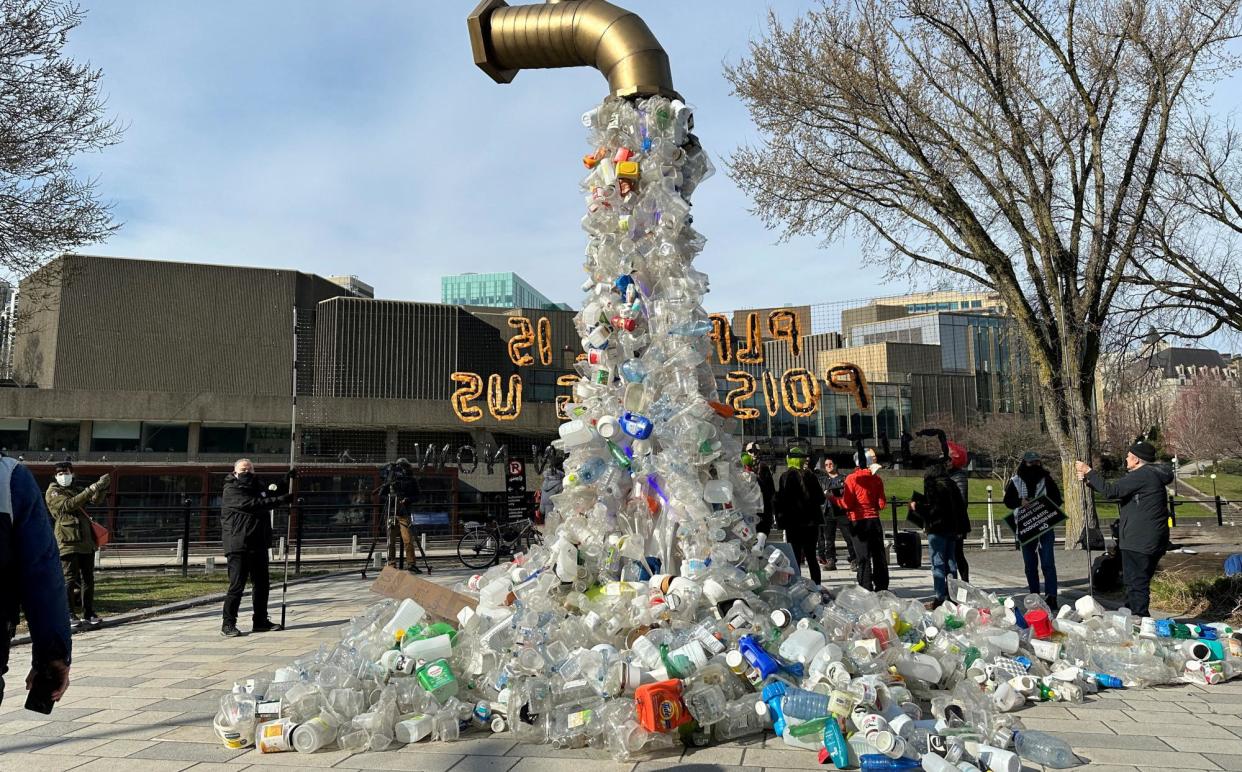Developed countries accused of bowing to lobbyists at plastic pollution talks

Campaigners are blaming developed countries for capitulating at the last minute to pressure from fossil fuel and industry lobbyists, and slowing progress towards the first global treaty to cut plastic waste.
Delegates concluded talks in Ottawa, Canada, late on Monday, with no agreement on a proposal for global reductions in the $712bn (£610bn) plastic production industry by 2040 to address twin issues of plastic waste and huge carbon emissions.
They agreed to hold more discussions before the last summit on the treaty in Busan, South Korea, in November.
But two years on from a historic agreement in Nairobi to forge a global treaty to cut plastic waste, delegates said countries were just wasting time. A proposal from Peru and Rwanda to address for the first time the scale of plastic production in order cut waste was supported by 29 countries including Australia, Denmark, Nigeria, Portugal, the Netherlands and Nigeria, who signed a declaration, “the Bridge to Busan”, calling on all delegates to ensure plastic production was addressed.
The UK and US did not support the proposal to cut plastic production.
Juliet Kabera, the director general of the Rwanda environment management authority, said: “Rwanda’s vision for the treaty is to achieve sustainable production of plastics. We need a global target based on science to measure our collective actions.”
But as talks headed into the night on Monday, there was no agreement on putting plastic production at the centre of the treaty.
David Azoulay, the director of environmental health at the Center for International Environmental Law (CIEL), said while a handful of countries had taken a stand to keep ambitious proposals alive, most countries accepted a compromise at the last minute that played into the hands of petrostates and industry influences.
“From the beginning of negotiations, we have known that we need to cut plastic production to adopt a treaty that lives up to the promise envisioned … two years ago,” he said. “In Ottawa, we saw many countries rightly assert that it is important for the treaty to address production of primary plastic polymers.
“But when the time came to go beyond issuing empty declarations and fight for work to support the development of an effective intersessional programme, we saw the same developed member states who claim to be leading the world towards a world free from plastic pollution, abandon all pretence as soon as the biggest polluters look sideways at them.”
The US was singled out for criticism for blocking talks on cutting plastic production.
“The United States needs to stop pretending to be a leader and own the failure it has created here,” said Carroll Muffett, the president of CIEL. “When the world’s biggest exporter of oil and gas, and one of the biggest architects of the plastic expansion, says that it will ignore plastic production at the expense of the health, rights and lives of its own people, the world listens.”
He said that despite signalling at the G7 summit this month that it would commit to reduce plastic production, in Ottawa the US failed to follow through on its promises.
The failure to pursue ambitious cuts to plastic production came after a record number of fossil fuel and petrochemical lobbyists attended the summit in Canada.
Graham Forbes, Greenpeace’s head of delegation to the global plastics treaty negotiations, said: “The world is burning and member states are wasting time and opportunity. We saw some progress, aided by the continued efforts of states such as Rwanda, Peru, and the signatories of the Bridge to Busan declaration in pushing to reduce plastic production.
“However, compromises were made on the outcome which disregarded plastic production cuts, further distancing us from reaching a treaty that science requires and justice demands.”
Rich Gower, a senior economist at the NGO Tearfund, said: “An ambitious and effective treaty is still possible, but negotiations are on a knife-edge: time is short and strong opposition remains from the petrochemicals industry and states connected with it, even as their products pile up on street corners and in watercourses around the world.”
Representatives of the petrochemical industry said they were committed to a global treaty to cut plastic waste. But they pushed back on reductions in plastic production, an industry worth $712bn in 2023.
Chris Jahn, the council secretary of the International Council of Chemical Associations (ICCA), speaking on behalf of the industry group Global Partners for Plastics Circularity, said: “Our industry is fully committed to a legally binding agreement all countries can join that ends plastic pollution without eliminating the massive societal benefits plastics provide for a healthier and more sustainable world. We will continue to support governments’ efforts by bringing forth science-based and constructive solutions that leverage the innovations and technical expertise of our industry.”


